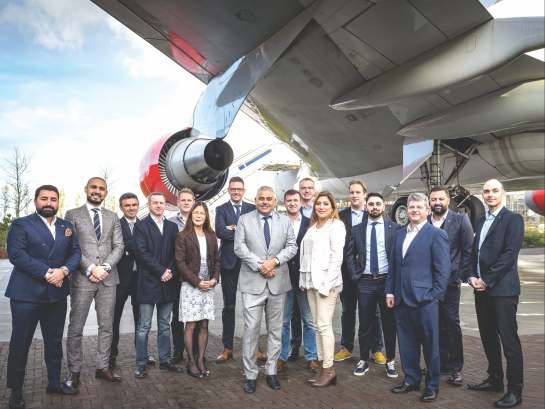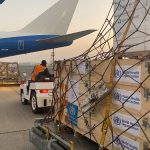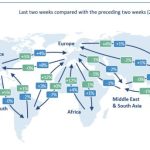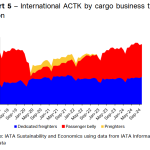Global GSA Group Bridging the gap between airlines and cargo operations
In 2022, airline net losses are expected to be $6.9 billion (an improvement on the $9.7 billion loss for 2022 in IATA’s June outlook). This is significantly better than losses of $42 billion and $137.7 billion that were realized in 2021 and 2020 respectively.
Air cargo revenues played a key role in cutting losses with revenues expected to reach $201.4 billion.While some of the airlines tweaked their services towards cargo, many of them relied on outsourcing, finding value and growth, now moving towards profits.
Outsourcing is the operative word. A key player in this realm is Global GSA Group which is active in 46 countries, partnering with 62 airlines, across almost all continents.
Founded in 1995 as Global Airline Services in the Netherlands, it has fast expanded in other countries, starting with offices in Belgium, the UK and Germany.
In 2006, Global GSA Group was established to manage all subsidiaries and there has been no looking back. Giving a total perspective of the Global GSA Group, is its CEO, Ismail Durmaz to Air Cargo Update. Excerpts of the interview below.
ACU: Is Global GSA Group, truly global, in the sense that you are present in all the continents?If not, what are your plans?
Ismail Durmaz (Durmaz):Yes, we are definitely global. We have offices everywhereexcept in Africa and Oceania. But we have developed partnerships with other GSAs that allow us to have an indirect presence in these regions.
ACU: Could you tell us how air cargo has evolved in these years and how Global GSA Group has taken initiatives that may have impacted the way business is done?
Durmaz: Over the past three decades, air cargo has evolved significantly due to changes in technology, globalization, e-commerce and currently sustainability awareness.
 The use of automation, digitization and real-time tracking has revolutionized the way air cargo is transported, tracked and delivered. The growth of international trade and e-commerce has led to increased air cargo volumes, with many products being transported globally. Furthermore, with a growing concern for the environment, the air cargo industry is seeking to reduce its carbon footprint by using more fuel-efficient aircraft and exploring alternative fuels.
The use of automation, digitization and real-time tracking has revolutionized the way air cargo is transported, tracked and delivered. The growth of international trade and e-commerce has led to increased air cargo volumes, with many products being transported globally. Furthermore, with a growing concern for the environment, the air cargo industry is seeking to reduce its carbon footprint by using more fuel-efficient aircraft and exploring alternative fuels.
Global GSA Group has embraced these evolutions. Regarding technology, we have invested heavily in digitalization and automation, enhancing the efficiency of our operation.
Furthermore, Global GSA Groupis puttingemphasis on sustainability. Committed to reducing our carbon footprint we have taken multiple steps to achieve this, implemented in accordance with the specific guidelines we have developed.
Moreover, we havekept developing our value-added services, adapting each time to the new realities of the industry. This has enhanced our performance and the overall customer experience.
ACU: What is the air cargo market size itself and how do you look at this huge pie?
Durmaz:In 2022, the air cargo market size reached US$ 287.4 Billion according to IMARC Group’s report. The sudden outbreak of the COVID-19 pandemic has led to the growing adoption of air freight services while capacity was limited, resulting in an overall increase of yields. Despite the slow start in 2023, we forecast a steady growth in the following years.
ACU: Why do airlines need to outsource cargo operations? Is it because they need to focus more on passenger airlines or they do not have the wherewithal to start cargo operations (in terms of expertise, skilled personnel, costs, etc.)?
Durmaz:In a market that has continued to evolve and become more complex, airlines need partners with solid local market knowledge. Global GSA Group provides that.
In addition, not all carriers have local offices to call upon and even then, when a GSA is assigned to represent a carrier in a specific region, agents are not allowed to book directly with the carrier.
Beyond our local market knowledge, we offer better customer service at a time when many companies are willing to outsource the sale of their capacity to better focus on other issues that the current economic situation brings.The costs of outsourcing are therefore lower than running your own office and represent a one-time investment as well as other benefits such as not having to deal with all sorts of legal and compliance issues, which are different in every country.
ACU: What strengths does Global GSA Group bring to the table that airlines find attractive?
Durmaz:Despite all the developments, this business is still people-oriented. The good results are mainly due to the relationships you have and the quality of the services you provide.
At Global GSA Group, we always make sure that all our airline partners receive dedicated services. Our extreme flexibility, extensive local expertise and highly engaged workforce are truly our strength and drive our success.
ACU: There is a mention of ‘Code of Conduct’ within the group, what is that and how does it work across continents and how does it help the group, per se?
Durmaz: The Code of Conduct is a set of values, principles and rules outlining what our group expects from its employees. With this Code, we aim to create a respectful and safe working environment for our staff,while ensuring that they comply with national and international laws and regulations.
ACU: What is your employee strength and what is the road map, say for the next five years? What kind of training takes place for them to keep them abreast of developments?
Durmaz: We currently have 475 employees worldwide.As a group we have implemented a strategic approach to attract, retain, and develop our staff. We aim to increase the number of employees with certain certifications and skills such as agility and creativity in the solutions we implement, while providing our current staffwith ongoing training to keep up with new developments in our field.
To meet these goals, we invest in various training and development programs: on-the-job training where they learn new skills by working alongside experienced colleagues or mentors; online courses but also sending employees to attend workshops, seminars, conferences,fairs, and events.
ACU: We are in an era where there is emphasis on sustainability, environment, and governance, tell us how Global GSA Group has factored these in its businesses?
Durmaz: As Global GSA Group, we are aware of the major role our industry plays in these issues. Even though we don’t have a direct impact because we don’t own assets such as planes, trucks or warehouses, we know that we have a responsibility to act in this area. That’s why we have created a new position within our management team, the Chief Sustainable Officer, to address these issues at the highest level.
It is not only about implementing actions that we, as Global GSA Group, will carry out, but also about taking responsibility for advising our partners, such as airlines and freight forwarders, to prioritize these issues.
ACU:While passenger airlines have adopted digitization much faster than expected, cargo hasn’t? What could be the reasons for the same? Also tell us Global GSA Group’s digitization journey?
Durmaz:The supply chain of the passenger operations is shorter and less complicated. Cargo, on the other hand, has many factors and variables to consider. Not only regarding shipments variations, but also with much more key stakeholders involved.It is therefore more complicated to implement a digital solution that works smoothly and satisfies all the stakeholders involved.
We are investing continuously in this area, in particular by taking advantage of the solutions developed by CargoTech. Whether it is for booking, capacity and revenue optimization or pricing decisions, the solutions we use have already proven to be particularly insightful for us and our partners, enabling better performance.
Partnering with CargoTech has taken Global GSA Group to a new level, approaching digitalization no longer as mere necessary tools to implement but as ongoing innovations to take an active part in. Currently, we have started to adapt the available tools to our specific needs. This will surely make a considerable difference for Global GSA Group.
ACU: Tell us how Global GSA Group performed during the height of COVID-19 and also post that?
Durmaz:Our agility was the key factor in our success during the Covid crisis. Our local teams were able to act fast, adapt to the new working conditions, monitor market conditions, act with new sales strategies, and ensure the best possible results for our partners.
We have once again proven to them that GSAs are a real added-value to their operations. Even after the Covid, we have managed to perform despite the drop in demand and capacities.
ACU: What are the challenges for an air cargo operator such as yours, particularly having so many airlines as partners? Also challenges of operations, regulatory compliances? What needs to be done to improve ‘ease of doing business’?
Durmaz:Despite a general drop in demand and capacities, our strategic objective remains the same: preserving the same level of service and expertise for our customers to ensure they best overcome the turbulences.
In these uncertain times, we remain convinced that developing cutting-edge technology solutions will have a direct impact on our efficiency and our ability to provide customers the best services. In that respect, we have chosen to boost our investments in digital transformation, as it will be essential to meet the challenges of the coming year.
ACU: What is Global GSA Group’s expansion plans, in terms of both organic and inorganic growth?
Durmaz:Our expansion plans for 2023 are focused on the Americas and Southeast Asia. The increase in e-commerce sales and the growth in global demand from APAC countries make these two regions important market drivers with many opportunities. We therefore plan to strengthen our position in these areas through the creation of new companies and the acquisition of existing ones.
ACU: Is outsourcing and consolidation the future for air cargo? If yes, what strategic moves is Global GSA Group planning?
Durmaz: Freight GSA companies are still crucial to carriers, and we are seeingan increase in demand from carriers with their own setups abroad shifting to the GSA concept. Carriers managing their own offices abroad, experience significant difficulties, that influence their performance accordingly.
Furthermore, the operational costs are higher, and the carrier runs a bigger risk and has more liabilities. GSA companies have proven their value over the years, and even more during the pandemic, with their ability to rapidly adapt to new market conditions. As carriers serve more and more destinations, the outsourcing option is much more effective and efficient. Global GSA is committed to gaining new market share and has ensured that it is fully equipped to do so, both in terms of technology and human resources.














